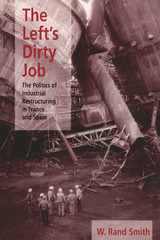
How can workers retain job security in an industry currently experiencing extensive restructuring and retrenchment? In the United States, massive layoffs in the 1980s in industries like steel have resulted in increased worker demands for job security provisions in collective agreements and legal protections against layoffs. In many Western European countries, where private-sector practices ensuring strong job security and laws regulating layoff practices were well established, the 1980s brought strong pressure from business to relax job security in order to facilitate rapid restructuring.
Susan Houseman's book presents some of the first hard evidence on the economic effects of providing job security, evidence gathered during the restructuring of the European Community's steel industry in the 1970s and 1980s. The author reviews personnel practices by the Community's leading steel companies, basing her analysis on extensive interviews with employers, workers, and government officials in West Germany, France, Britain, Belgium, Luxembourg, Italy, and the Netherlands. Drawing on economic theory, she shows that the extent of workers' rights to job security will affect how an industry optimally adjusts to a decline in demand and to a situation of excess capacity.
Using detailed plant data, she shows that job security for workers affected decisions concerning employment, production, investment, and plant closures in the industry, While job security for workers may slow the process of industrial restructuring and result in lower productivity, the author points out that it also generates important social benefits, including community stability and a more equitable distribution of the risks and costs of economic change.
This book will draw the attention of policymakers in government and in international organizations such as the European Community, the OECD, and the ILO. It will also be of interest to scholars in labor economics, industrial relations, public policy, and business.


Why is America losing its competitive edge in basic industries ranging from automobile manufacture to consumer electronics? The reason, Michael Best shows, is the rigid command and control structures that are typical of big business in America. America firms lack the organizational flexibility of the "new competition" practiced by companies in Italy, West Germany, and Japan. The secret to the success of these foreign firms is that they are organized from top to bottom to pursue continuous improvements in methods, products, and processes. They seek competitive advantage not through lowest-cost production but through superior product design. This requires an unusual degree of organizational flexibility, which in turn demands organizational commitments to problem solving, constant attention to detail, and an integration of thought and action in the work place.
The New Competition posits a strategic tension between market competition and cooperation in successful industrial societies. Instead of bargaining with suppliers and customers at arm's length, firms can forge consultative relations with them, facilitating the flow of valuable advice, suggestions, and information and crucially modifying a key processor design. Instead of engaging in price rivalry, companies can pursue product-related rivalries that increase their international competitiveness. Best envisions a new role for national industrial policy—one not of bailing out sick firms in dying industries but of shaping industrial sectors and markets. It would encourage firms to cooperate in terms of the form that competition takes, one that involves products instead of prices.
READERS
Browse our collection.
PUBLISHERS
See BiblioVault's publisher services.
STUDENT SERVICES
Files for college accessibility offices.
UChicago Accessibility Resources
home | accessibility | search | about | contact us
BiblioVault ® 2001 - 2024
The University of Chicago Press









